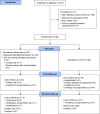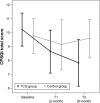Tai chi qigong as a means to improve night-time sleep quality among older adults with cognitive impairment: a pilot randomized controlled trial
- PMID: 27698557
- PMCID: PMC5034925
- DOI: 10.2147/CIA.S111927
Tai chi qigong as a means to improve night-time sleep quality among older adults with cognitive impairment: a pilot randomized controlled trial
Abstract
Purpose: Age-related cognitivee decline is a growing public health concern worldwide. More than a quarter of adults with cognitive impairment experience sleep disturbance. The objective of this pilot study was to evaluate the preliminary effects of tai chi qigong (TCQ) on improving the night-time sleep quality of older adults with cognitive impairment.
Participants: Older adults with cognitive impairment who complain of sleep disturbance.
Methods: A randomized controlled trial with two groups. Fifty-two subjects were recruited from two district elderly community centers and randomly assigned to either the TCQ group (n=27) or the control group (n=25). The intervention group received TCQ training consisting of two 60-minute sessions each week for 2 months. The control group was advised to maintain their usual activities. Sleep quality was measured by the Chinese Pittsburgh Sleep Quality Index. Quality of life was measured by Short-form 12, cognitive functions measured by mini-mental state examination, and subjective memory deficits measured by the memory inventory for Chinese.
Results: Data were collected at baseline, 2 months, and 6 months. Significant results were noted at 6 months in the Chinese Pittsburgh Sleep Quality Index global score (P=0.004), sleep duration (P=0.003), habitual sleep efficiency (P=0.002), and the Short-form 12 mental health component (P<0.001). The TCQ participants reported better sleep quality and a better (quality of life) mental health component than the control group.
Conclusion: TCQ can be considered a useful nonpharmacological approach for improving sleep quality in older adults with cognitive impairment.
Clinical trial registration: CUHK_CCT00448 (https://www2.ccrb.cuhk.edu.hk/registry/public/287).
Keywords: cognitive decline; mind–body exercise; nonpharmacological approach; sleep disturbances.
Figures
Similar articles
-
Effect of Tai Ji Quan training on self-reported sleep quality in elderly Chinese women with knee osteoarthritis: a randomized controlled trail.Sleep Med. 2017 May;33:70-75. doi: 10.1016/j.sleep.2016.12.024. Epub 2017 Feb 6. Sleep Med. 2017. PMID: 28449910 Clinical Trial.
-
Effectiveness of a Tai chi Qigong program in promoting health-related quality of life and perceived social support in chronic obstructive pulmonary disease clients.Qual Life Res. 2010 Jun;19(5):653-64. doi: 10.1007/s11136-010-9632-6. Epub 2010 Mar 15. Qual Life Res. 2010. PMID: 20229333 Clinical Trial.
-
Effects of tai chi on cognition and instrumental activities of daily living in community dwelling older people with mild cognitive impairment.BMC Geriatr. 2018 Feb 2;18(1):37. doi: 10.1186/s12877-018-0720-8. BMC Geriatr. 2018. PMID: 29394884 Free PMC article. Clinical Trial.
-
Effects of Tai Chi and Qigong on cognitive and physical functions in older adults: systematic review, meta-analysis, and meta-regression of randomized clinical trials.BMC Geriatr. 2023 Jun 6;23(1):352. doi: 10.1186/s12877-023-04070-2. BMC Geriatr. 2023. PMID: 37280512 Free PMC article.
-
Effects of Tai Chi and Qigong on physical function and psychiatric symptoms among individuals with mental illness: a systematic review and meta-analysis of randomized controlled trials.Ann Behav Med. 2025 Jan 4;59(1):kaaf019. doi: 10.1093/abm/kaaf019. Ann Behav Med. 2025. PMID: 40165437
Cited by
-
Long-Term Effects of Tai Chi Intervention on Sleep and Mental Health of Female Individuals With Dependence on Amphetamine-Type Stimulants.Front Psychol. 2018 Aug 20;9:1476. doi: 10.3389/fpsyg.2018.01476. eCollection 2018. Front Psychol. 2018. PMID: 30177899 Free PMC article.
-
Effects of Chinese traditional ethnic sports on sleep quality among the elderly: a systematic review and meta-analysis.PeerJ. 2025 Feb 21;13:e19019. doi: 10.7717/peerj.19019. eCollection 2025. PeerJ. 2025. PMID: 39995989 Free PMC article.
-
The Science of Tai Chi and Qigong as Whole Person Health-Part I: Rationale and State of the Science.J Integr Complement Med. 2025 Jun;31(6):499-520. doi: 10.1089/jicm.2024.0957. Epub 2025 Mar 17. J Integr Complement Med. 2025. PMID: 40091656 Review.
-
Individual Stress Prevention through Qigong.Int J Environ Res Public Health. 2020 Oct 8;17(19):7342. doi: 10.3390/ijerph17197342. Int J Environ Res Public Health. 2020. PMID: 33050017 Free PMC article. Review.
-
Exercise can improve sleep quality: a systematic review and meta-analysis.PeerJ. 2018 Jul 11;6:e5172. doi: 10.7717/peerj.5172. eCollection 2018. PeerJ. 2018. PMID: 30018855 Free PMC article.
References
-
- Centers for Disease Control and Prevention Cognitive Impairment: A Call for Action, Now! [Accessed February 10, 2015]. Available from: http://www.cdc.gov/aging/pdf/cognitive_impairment/cogimp_poilicy_final.pdf. [Updated February 2011]
-
- Hospital Authority Dementia. [Accessed February 10, 2015]. Available from: http://www21.ha.org.hk/smartpatient/en/chronicdiseases_zone/details.html.... [Updated 2 February 2015]
-
- Roth HL. Dementia and sleep. Neurol Clin. 2012;30(4):1213–1248. - PubMed
Publication types
MeSH terms
LinkOut - more resources
Full Text Sources
Other Literature Sources
Medical



